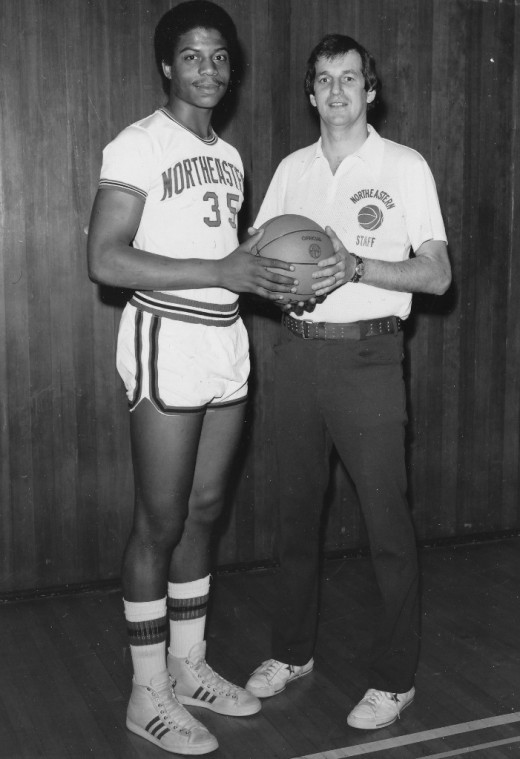Last month, Jim Calhoun retired from the University of Connecticut with three National Championships, 866 wins, and induction into the Hall Of Fame in 2005. The Braintree native is widely regarded as one of the greatest minds in the history of basketball.
What you might not have known, however, is that the first player he ever recruited after Northeastern moved up to D1 was 6 foot 8, 230 pound center Keith Motley. Motley played four years at Northeastern (where Calhoun got his start) and was named a captain for his senior season. Motley led the Huskies in rebounding his senior year with 7.8 per game. He was inducted in the school’s Hall of Fame in 1999. I recently sat down with the chancellor to reflect on those early days, and to see how Calhoun has had an impact on UMass Boston.
Motley said, “I went to the University of Pittsburgh Upward Bound program, and one of my friends was at Carnegie Mellon, a guy named John Clarke. Through him I got to know a guy named Dr. Richard Mullins, who was the director of Carnegie Mellon’s Upward Bound program. He was a Northeastern athlete who played with Mike Jarvis and all of those guys up there. He was telling us about Northeastern University in Boston.” He added, “When he was telling me about it, I thought he was talking about Northwestern University in Chicago, and then my family and I thought it was Northeastern Illinois because they were the Huskies and Northeastern were the Huskies as well.”
Motley recalled how Mullins was a role model for him, and helped him make the choice during his recruitment into basketball. His best friend and high school teammate Mel Bennett (who went on to play in the ABA and NBA from 1975-1982) “was being recruited all over the place. But they were only trying to recruit me because of Mel, who was a year below me. As I talked to Dr. Mullins about that, which is hard for a young guy to talk about, he told me that Northeastern was starting a Division 1 basketball program under a young coach named Jim Calhoun, and his assistant was Mike Jarvis.” The pair came often to Pittsburgh to recruit both Motley and Bennett. Although Bennett did not sign on, in 1974 Motley committed to become Calhoun’s first career D1 recruit.
Over his four years at Northeastern, Motley and Calhoun forged a strong relationship. Motley reminisced that although Calhoun had requested that he and his teammates remove their afros at a time when most teams had a strict crew cut rule, they convinced Calhoun to let them keep them. He also recounted a time when someone held up a sign attacking Calhoun for benching him and some of his other black teammates. The sign was making the coach’s children cry, so Motley “went up into the stands and pulled down the sign in the middle of the game.” He recalled that he told the sign-holder, “You’re not going to do that to his kids.”
The greatest story that the chancellor shared, however, was one about when he returned home to Pittsburgh after his freshman year to take a lucrative, $13-per-hour job at a steel mill. Motley had received good grades in his first year, but he also had many incompletes on his transcript. He recounted how Calhoun forced him to return to Boston and finish his classes: “[Calhoun] called my mother to tell her that I wasn’t going to graduate on time if I didn’t fix those incompletes. They made me quit my job and take the bus back to Boston. I was so mad that it was frightening. I was making more money than I’d ever made in my life. He even got the dean on me, and he called my mom.” Calhoun’s persistence allowed the center to graduate on time, move on, and eventually take the helm at UMass Boston.
After graduation, Motley played professionally for a few years in the Continental Basketball Association, including a stint with the Anchorage Northern Knights. He then joined Calhoun as a part-time assistant head coach for Northeastern for 20 years before devoting all of his time to his position in student services. He was inaugurated as chancellor here in 2005.
Calhoun and Motley remain close to this day. Calhoun spoke at Motley’s inauguration, as well as at commencement last year. When asked what piece of advice from Calhoun he has taken to heart and put into the university, Motley said, “‘You’re never bigger than the thing that you care about the most. Don’t think of yourself in a way that makes you feel like the world has to revolve around you.’ He also shared with me that people matter.”
Motley also commented on Calhoun’s larger impact on the sport. He recalled, “You should have seen some of the letters that he received. He was one of the first coaches in this city to start five African-American players, and the hate mail he got for that, the hate mail he got on the road, the things they would say to us on the road, the things that our teammates would say in the locker room when we first got there…He had to deal with that because they weren’t used to having six black guys on a team of 15. It was always one or two. Coach Calhoun changed the whole culture in Boston and around the country.”
It’s indisputable that the relationship these men have forged has had a huge impact on UMass over the last seven years. According to Motley, Calhoun still cries when he sees his kids and tell them that their father “was the first guy to ever say yes to me, and he’s been in my life ever since”. Calhoun will now begin his retirement, but he will unquestionably remain a part of UMass Boston through his original star pupil, who went on to do pretty well for himself.

